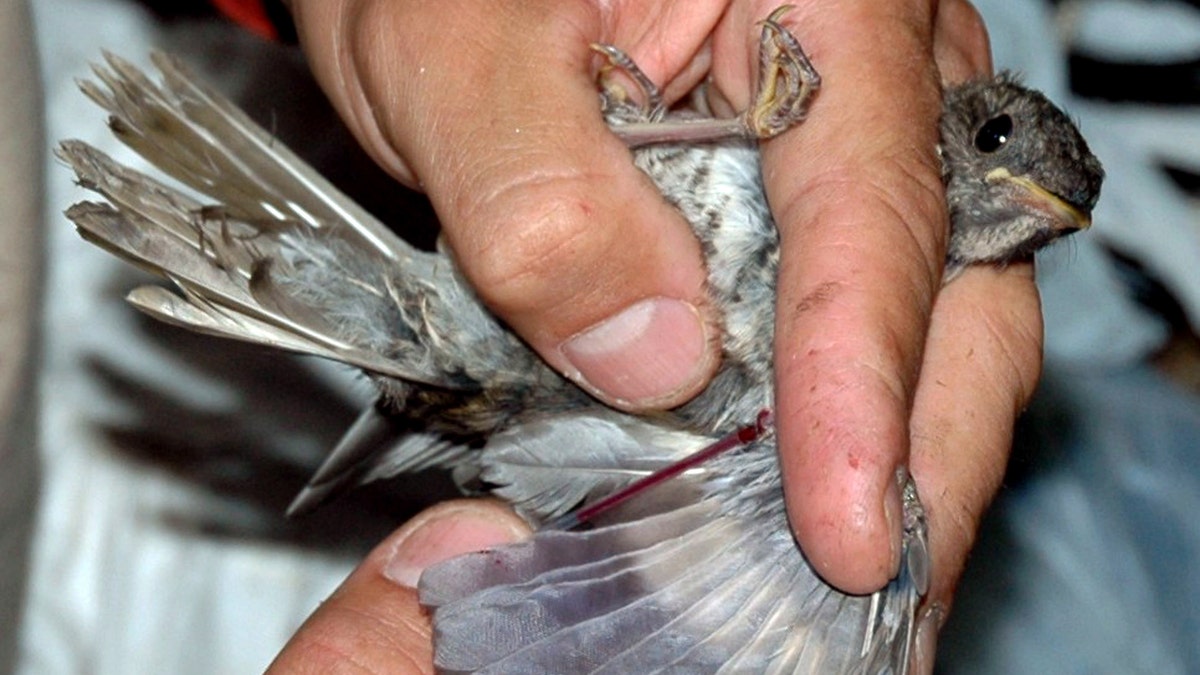
An alliance of North American scientists is supporting work in the Dominican Republic to preserve the winter habitat of the rare Bicknell's thrush, which breeds on mountaintops in New York, New England and Canada. (AP)
The rare Bicknell thrush breeds in parts of the northeast and southeastern Canada, but it’s where it spends its winter that has it facing near extinction.
The sparrow-sized bird spends the winters on the island of Hispaniola, where they are threatened by charcoal production, subsistence farming, logging, livestock grazing and other threats. But now scientists in North America are supporting work in the Dominican Republic to try and preserve these birds, whose annual population has declined from 7 to 19 percent the past two decades. There are currently about 100,000 of these birds in existence.
"This project is a new effort to get conservation done in the wintering ground, which we are convinced is the main limiting factor for Bicknell's thrush," said Chris Rimmer, executive director of the Vermont Center for Ecostudies.
This project is a new effort to get conservation done in the wintering ground, which we are convinced is the main limiting factor for Bicknell's thrush.
While the bird nests 1,200 miles north of the Dominican Republic, at elevations over 3,000 feet in New York, Maine, New Hampshire, Vermont and southeastern Canada, its biggest threat is when it flies south to escape the cold.
"The majority of its problems are on the wintering grounds,” said Ken Rosenberg, director of conservation science at the Cornell Lab of Ornithology
Lengthy field research has provided scientists with ample knowledge of the bird, Rimmer said, and now it's time to move to taking action.
"Ultimately we've got to conserve some habitat or it doesn't matter how much we learn about it," he said.
Under a new initiative sponsored by the Adirondack Council, Nature Conservancy, Audubon New York, Vermont Center for Ecostudies and Wildlife Conservation Society, grants will be awarded on a competitive basis to conservation groups in the Dominican Republic.
The first, for $5,000, was awarded recently to Grupo Jaragua, whose biologists will study the thrush in forested mountains on the Dominican Republic's border with Haiti. Grupo will develop a conservation plan and work with local communities to make sure land is used sustainably without sacrificing people's livelihoods, Rimmer said.
"The only route to lasting conservation is to empower local people to do the work," Rimmer said.
The Bicknell's thrush has an unusual mating system. While most songbirds are territorial, with monogamous pairs, Bicknell females mate with multiple males and chicks are fed by as many as four males.
"It's an amazing system," Rimmer said. "We think it relates to the fact that there are more than twice as many males as females."
Scientists believe that imbalance may be because females are pushed into poorer quality habitat in the wintering grounds. They're focusing more conservation efforts on winter habitat that's dominated by females.
The fund that provided the Grupo Jaragua grant was started in 2006 after New York state proposed additional ski trails at the state-owned Whiteface Mountain ski center, said Mike Burger of Audubon New York, based in Ithaca. Conservation groups worked with the ski center to make sure the expansion wouldn't harm the thrush, which breeds on Whiteface, and the ski center put up a donation box for people who use the mountain.
Donations were the basis for the Bicknell's Thrush Habitat Protection Fund, managed by the Adirondack Community Trust in Lake Placid.
Widely accepted climate models predict the species' coniferous breeding habitat in the Northeast will shrink dramatically, a process that has already begun, said Mollie Matteson of the Center for Biological Diversity in Richmond, Vt.
The U.S. Fish and Wildlife Service launched a yearlong review in August to consider endangered species status for the thrush.
Based on reporting by The Associated Press.
Follow us on twitter.com/foxnewslatino
Like us at facebook.com/foxnewslatino
